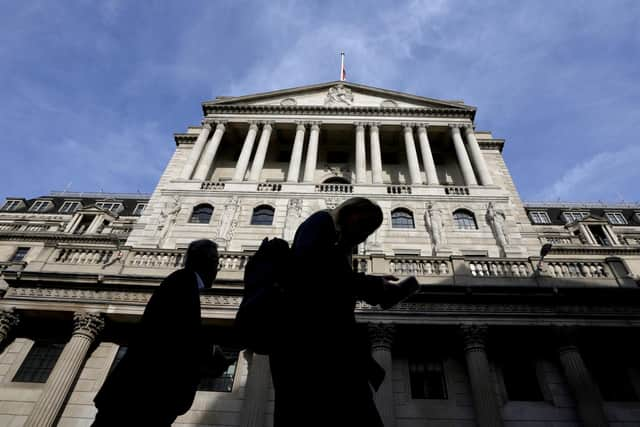Interest rates: Bank of England hikes rate by 0.5% to highest level in more than 13 years
The central bank had previously projected the economy would grow in the current financial quarter but said it now believes Gross Domestic Product (GDP) will fall 0.1 per cent.
It comes after a reported 0.2 per cent fall in GDP in the second quarter and would mean the economy is currently in recession.


Advertisement
Hide AdAdvertisement
Hide AdA technical recession is when the economy shrinks for two quarters in a row.
The Bank’s Monetary Policy Committee (MPC) decided to raise rates to 2.25 per cent – their highest since November 2008 – from 1.75 per cent, in an effort to grapple big increases in the cost of living.
In committee minutes, it said the “tight labour with wage growth and domestic inflation” above targets called for a “forceful response”.
Nevertheless, the hike was below the expectations of the financial markets, who had predicted a 0.75 percentage point hike in line with the rate increase announced by US Federal Reserve on Wednesday.
The MPC came to the decision after five members of the nine-strong board voted for the 0.5 percentage point increase, including Governor of the Bank Andrew Bailey.
Three members – Jonathan Haskel, Catherine Mann and Dave Ramsden – voted in favour of a 0.75 percentage point rise, while on member – Swati Dhingra – called for a 0.25 percentage point increase.
The decision to lift rates is a bid to keep inflation under control. It is the best tool that the Bank of England has to steer inflation – currently at 9.9% – back to its 2% target.
In the September meeting, the MPC also said inflation is now not due to soar as high as previously expected after Government announced plans to freeze energy prices for households earlier this month.
Advertisement
Hide AdAdvertisement
Hide AdConsumer Price Index (CPI) inflation is now set to peak at “just under 11 per cent” in October. This would mark the highest inflation the UK has witnessed since January 1982.
In its previous meeting in August, the Bank of England warned that inflation was likely to peak at 13.3 per cent and the country would witness five consecutive quarters of recession.
However, the Bank’s MPC has witnessed a hectic political period in the seven weeks since last meeting which has seen Liz Truss appointed Prime Minister, with her new Government revealing energy support for consumers and businesses.
Chancellor of the Exchequer Kwasi Kwarteng is also due to announce new fiscal measures, dubbed the Growth Plan, on Friday. The Bank said it will consider the impact of this plan at its next MPC meeting.
The Bank also voted unanimously to reduce quantitative easing by £80 billion over the next 12 months to £758bn.
The MPC was originally set to announce its decision on Thursday September 15, but delayed this for a week due to the Queen’s death.
Comments
Want to join the conversation? Please or to comment on this article.
